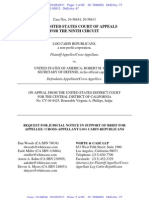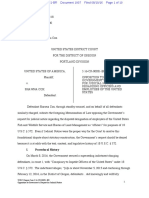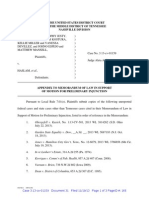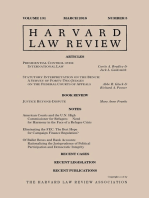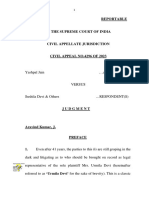0 ratings0% found this document useful (0 votes)
58 viewsIn The United States District Court For The District of Massachusetts
In The United States District Court For The District of Massachusetts
Uploaded by
Equality Case FilesThis document is an amended notice to the court regarding two pending lawsuits challenging the constitutionality of the Defense of Marriage Act. It summarizes the U.S. Department of Justice's determination that Section 3 of DOMA violates equal protection under the Fifth Amendment as applied to same-sex couples legally married under state law. It explains that heightened scrutiny should apply to classifications based on sexual orientation due to the history of discrimination against gays and lesbians, the immutability of sexual orientation, and their limited political power.
Copyright:
Attribution Non-Commercial (BY-NC)
Available Formats
Download as PDF, TXT or read online from Scribd
In The United States District Court For The District of Massachusetts
In The United States District Court For The District of Massachusetts
Uploaded by
Equality Case Files0 ratings0% found this document useful (0 votes)
58 views9 pagesThis document is an amended notice to the court regarding two pending lawsuits challenging the constitutionality of the Defense of Marriage Act. It summarizes the U.S. Department of Justice's determination that Section 3 of DOMA violates equal protection under the Fifth Amendment as applied to same-sex couples legally married under state law. It explains that heightened scrutiny should apply to classifications based on sexual orientation due to the history of discrimination against gays and lesbians, the immutability of sexual orientation, and their limited political power.
Original Description:
Doc #29 - Amended Notice to Court
Original Title
1:11-cv-11905 #29
Copyright
© Attribution Non-Commercial (BY-NC)
Available Formats
PDF, TXT or read online from Scribd
Share this document
Did you find this document useful?
Is this content inappropriate?
This document is an amended notice to the court regarding two pending lawsuits challenging the constitutionality of the Defense of Marriage Act. It summarizes the U.S. Department of Justice's determination that Section 3 of DOMA violates equal protection under the Fifth Amendment as applied to same-sex couples legally married under state law. It explains that heightened scrutiny should apply to classifications based on sexual orientation due to the history of discrimination against gays and lesbians, the immutability of sexual orientation, and their limited political power.
Copyright:
Attribution Non-Commercial (BY-NC)
Available Formats
Download as PDF, TXT or read online from Scribd
Download as pdf or txt
0 ratings0% found this document useful (0 votes)
58 views9 pagesIn The United States District Court For The District of Massachusetts
In The United States District Court For The District of Massachusetts
Uploaded by
Equality Case FilesThis document is an amended notice to the court regarding two pending lawsuits challenging the constitutionality of the Defense of Marriage Act. It summarizes the U.S. Department of Justice's determination that Section 3 of DOMA violates equal protection under the Fifth Amendment as applied to same-sex couples legally married under state law. It explains that heightened scrutiny should apply to classifications based on sexual orientation due to the history of discrimination against gays and lesbians, the immutability of sexual orientation, and their limited political power.
Copyright:
Attribution Non-Commercial (BY-NC)
Available Formats
Download as PDF, TXT or read online from Scribd
Download as pdf or txt
You are on page 1of 9
IN THE UNITED STATES DISTRICT COURT
FOR THE DISTRICT OF MASSACHUSETTS
____________________________________
)
SHANNON L. MCLAUGHLIN, et al., )
)
Plaintiffs, )
)
v. ) Civil Action No. 1:11-cv-11905
) Judge Richard G. Stearns
LEON PANETTA, et al., )
)
Defendants. )
____________________________________)
AMENDED NOTICE TO THE COURT
Defendants United States of America, Secretary of Defense Leon Panetta, Attorney
General Eric Holder, and Secretary of Veterans Affairs Eric Shinseki, by their undersigned
counsel, hereby notify this Court that their Notice to the Court (ECF No. 28), filed on February
21, 2012, inadvertently failed to attach one additional letter from the Attorney General to The
Honorable John A. Boehner, Speaker of the U.S. House of Representatives, dated February 23,
2011, which is now attached thereto. Defendants regret the error.
Dated: February 22, 2012
Respectfully Submitted,
TONY WEST
Assistant Attorney General
CARMEN M. ORTIZ
United States Attorney
ARTHUR R. GOLDBERG
Assistant Deputy Director
/s/ Jean Lin
JEAN LIN
Senior Trial Counsel
U.S. Department of Justice
Civil Division
Federal Programs Branch
20 Massachusetts Avenue, NW
Washington, DC 20530
Case 1:11-cv-11905-RGS Document 29 Filed 02/22/12 Page 1 of 3
Phone: (202) 514-3716
Fax: (202) 616-8470
email: jean.lin@usdoj.gov
Case 1:11-cv-11905-RGS Document 29 Filed 02/22/12 Page 2 of 3
CERTIFICATE OF SERVICE
I certify that on February 22, 2012, I filed the foregoing Amended Notice to the Court
using the CM/ECF system; and that the attorneys for the parties in this case as listed below are
registered CM/ECF users:
Ian McClatchey, Esq.
IMcClatchey@Chadbourne.com
CHADBOURNE & PARKE LLP
30 Rockefeller Plaza
New York, NY 10112
Abbe David Lowell, Esq.
ADLowell@Chadbourne.com
Christopher D. Man
CMan@Chadbourne.com
CHADBOURNE & PARKE LLP
1200 New Hampshire Ave., NW
Washington, DC 20036
John M. Goodman, Esq.
JGoodman@SLDN.org
David McKean
DMcKean@SLDN.org
SERVICEMEMBERS LEGAL DEFENSE NETWORK
Post Office Box 65301
Washington, DC 20035
_/s/__Jean Lin____________
Jean Lin
Case 1:11-cv-11905-RGS Document 29 Filed 02/22/12 Page 3 of 3
of t4t 1\ttllrntt!
Betg m. Ql. 205:30
February 23, 2011
The Honorable John A. Boehner
Speaker
U.S. House of Representatives
Washington, DC 20515
Re: Defense of Marriage Act
Dear Mr. Speaker:
After careful consideration, including review of a recommendation from me, the
President of the United States has made the determination that Section 3 of the Defense of
Marriage Act ("DOMA"), 1 U.S.C. 7,
1
as applied to same-sex couples who are legally married
under state law, violates the equal protection component of the Fifth Amendment. Pursuant to
28 U.S.C. 530D, I am writing to advise you of the Executive Branch's determination and to
inform you of the steps the Department will take in two pending DOMA cases to implement that
determination.
While the Department has previously defended DOMA against legal challenges involving
legally married same-sex couples, recent lawsuits that challenge the constitutionality of DOMA
Section 3 have caused the President and the Department to conduct a new examination of the
defense ofthis provision. In particular, in November 2011, plaintiffs filed two new lawsuits
challenging the constitutionality of Section 3 of DOMA in jurisdictions without precedent on
whether sexual-orientation classifications are subject to rational basis review or whether they
must satisfy some form of heightened scrutiny. Windsor v. United States, No. l:1O-cv-8435
(S.D.N.Y.); Pedersen v. OPM, No. 3:10-cv-1750 (D. Conn.). Previously, the Administration has
defended Section 3 in jurisdictions where circuit courts have already held that classifications
I DOMA Section 3 states: "In detennining the meaning of any Act of Congress, or of any ruling, regulation, or
interpretation ofthe various administrative bureaus and agencies of the United States, the word 'marriage' means
only a legal union between one man and one woman as husband and wife, and the word 'spouse' refers only to a
person of the opposite sex who is a husband or a wife."
Case 1:11-cv-11905-RGS Document 29-1 Filed 02/22/12 Page 1 of 6
based on sexual orientation are subject to rational basis review, and it has advanced arguments to
defend DOMA Section 3 under the binding standard that has applied in those cases.
2
These new lawsuits, by contrast, will require the Department to take an affirmative
position on the level of scrutiny that should be applied to DOMA Section 3 in a circuit without
binding precedent on the issue. As described more fully below, the President and I have
concluded that classifications based on sexual orientation warrant heightened scrutiny and that,
as applied to same-sex couples legally married under state law, Section 3 of DOMA is
unconstitutional.
Standard of Review
The Supreme Court has yet to rule on the appropriate level of scrutiny for classifications
based on sexual orientation. It has, however, rendered a number of decisions that set forth the
criteria that should inform this and any other judgment as to whether heightened scrutiny applies:
(1) whether the group in question has suffered a history of discrimination; (2) whether
individuals "exhibit obvious, immutable, or distinguishing characteristics that define them as a
discrete group"; (3) whether the group is a minority or is politically powerless; and (4) whether
the characteristics distinguishing the group have little relation to legitimate policy objectives or
to an individual's "ability to perform or contribute to society." See Bowen v. Gilliard, 483 U.S.
587,602-03 (1987); City a/Cleburne v. Cleburne Living Crr., 473 U.S. 432, 441-42 (1985).
Each of these factors counsels in favor of being suspicious of classifications based on
sexual orientation. First and most importantly, there is, regrettably, a significant history of
purposeful discrimination against gay and lesbian people, by governmental as well as private
entities, based on prejudice and stereotypes that continue to have ramifications today. Indeed,
until very recently, states have "demean[ed] the[] existence" of gays and lesbians "by making
their private sexual conduct a crime." Lawrence v. Texas, 539 U.S. 558, 578 (2003).3
2 See, e.g., Dragovich v. Us. Department ofthe Treasury, 2011 WL 175502 (N .D. Cal. Jan. 18, 2011); Gill v. Office
ofPersonnel Management, 699 F. Supp. 2d 374 (D. Mass. 2010); Smelt v. County ofOrange, 374 F. Supp. 2d 861,
880 (C.D. Cal.,2005); Wilson v. Ake, 354 F.Supp.2d 1298, 1308 (M.D. Fla. 2005); In re Kandu, 315 B.R. 123, 145
(Bkrtcy. W.D. Wash. 2004); In re Levenson, 587 F.3d 925,931 (9th CiT. E.D.R. Plan Administrative Ruling 2009).
3 While significant, that history of discrimination is different in some respects from the discrimination that burdened
African-Americans and women. See Adarand Constructors, Inc. v. Pena, 515 U.S. 200, 216 (1995)(classifications
based on race "must be viewed in light of the historical fact that the central purpose ofthe Fourteenth Amendment
was to eliminate racial discrimination emanating from official sources in the States," and "[t]his strong policy
renders racial classifications 'constitutionally suspect."'); United States v, Virginia, 518 U.S. 515, 531 (1996)
(observing that '''our Nation has had a long and unfortunate history of sex discrimination'" and pointing out the
denial ofthe right to vote to women until 1920). In the case of sexual orientation, some of the discrimination has
been based on the incorrect belief that sexual orientation is a behavioral characteristic that can be changed or subject
to moral approbation. Cf Cleburne, 473 U.S. at 441 (heightened scrutiny may be warranted for characteristics
"beyond the individual's control" and that "very likely reflect outmoded notions of the relative capabilities of' the
group at issue); Boy Scouts ofAmerica v, Dale, 530 U.S. 640 (2000) (Stevens, J., dissenting) ("Unfavorable opinions
about homosexuals 'have ancient roots. '" (quoting Bowers, 478 U.S. at 192.
2
Case 1:11-cv-11905-RGS Document 29-1 Filed 02/22/12 Page 2 of 6
Second, while sexual orientation carries no visible badge, a growing scientific consensus
accepts that sexual orientation is a characteristic that is immutable, see Richard A. Posner, Sex
and Reason 101 (1992); it is undoubtedly unfair to require sexual orientation to be hidden from
view to avoid discrimination, see Don't Ask, Don't Tell Repeal Act of201O, Pub. L. No. 111
321, 124 Stat. 3515 (2010).
Third, the adoption of laws like those at issue in Romer v. Evans, 517 U. S. 620 (1996),
and Lawrence, the longstanding ban on gays and lesbians in the military, and the absence of
federal protection for employment discrimination on the basis of sexual orientation show the
group to have limited political power and "ability to attract the [favorable] attention of the
lawmakers." Cleburne, 473 U.S. at 445. And. while the enactment of the Matthew Shepard Act
and pending repeal of Don't Ask, Don't Tell indicate that the political process is not closed
entirely to gay and lesbian people, that is not the standard by which the Court has judged
"political powerlessness." Indeed, when the Court ruled that gender-based classifications were
subject to heightened scrutiny, women already had won major political victories such as the
Nineteenth Amendment (right to vote) and protection under Title VII (employment
discrimination).
Finally, there is a growing acknowledgment that sexual orientation "bears no relation to
ability to perform or contribute to society." Frontiero v. Richardson, 411 U.S. 677, 686 (1973)
(plurality). Recent evolutions in legislation (including the pending repeal of Don't Ask, Don't
Tell), in community practices and attitudes, in case law (including the Supreme Court's holdings
in Lawrence and Romer), and in social science regarding sexual orientation all make clear that
sexual orientation is not a characteristic that generally bears on legitimate policy objectives. See,
e.g., Statement by the President on the Don't Ask, Don't Tell Repeal Act of2010 ("It is time to
recognize that sacrifice, valor and integrity are no more defined by sexual orientation than they
are by race or gender, religion or creed.")
To be sure, there is substantial circuit court authority applying rational basis review to
sexual-orientation classifications. We have carefully examined each of those decisions. Many
of them reason only that if consensual same-sex sodomy may be criminalized under Bowers v.
Hardwick, then it follows that no heightened review is appropriate a line of reasoning that does
not survive the overruling of Bowers in Lawrence v. Texas, 538 U.S. 558 (2003).4 Others rely on
claims regarding "procreational responsibility" that the Department has disavowed already in
litigation as unreasonable, or claims regarding the immutability of sexual orientation that we do
not believe can be reconciled with more recent social science understandings.
5
And none
4 See Equality Foundation v, City o/Cincinnati, 54 F.3d 261, 266-67 & n. 2. (6th Cir. 1995); Steffan v. Perry, 41
F.3d 677, 685 (D.C. Cir. 1994); Woodward v. United States, 871 F.2d 1068, 1076 (Fed. Cir. 1989); Ben-Shalom v.
Marsh, 881 F.2d 454, 464 (7th Cir. 1989); Padula v, Webster, 822 F.2d 97, 103 (D.C. Cir. 1987).
5See. e.g., Lofton v. Secretary o/the Dep't o/Children & Family Servs., 358 F.3d 804, 818 (lith Cir. 2004)
(discussing child-rearing rationale); High Tech Gays v. De/ense Indust. Sec. Clearance Office, 895 F.2d 563, 571
(9th Cir. 1990) (discussing immutability). As noted, this Administration has already disavowed in litigation the
3
Case 1:11-cv-11905-RGS Document 29-1 Filed 02/22/12 Page 3 of 6
-----------------------------------------
engages in an examination of all the factors that the Supreme Court has identified as relevant to a
decision about the appropriate level of scrutiny. Finally, many of the more recent decisions have
relied on the fact that the Supreme Court has not recognized that gays and lesbians constitute a
suspect class or the fact that the Court has applied rational basis review in its most recent
decisions addressing classifications based on sexual orientation, Lawrence and Romer.
6
But
neither of those decisions reached, let alone resolved, the level of scrutiny issue because in both
the Court concluded that the laws could not even survive the more deferential rational basis
standard.
Application to Section 3 of nOMA
In reviewing a legislative classification under heightened scrutiny, the government must
establish that the classification is "substantially related to an important government objective."
Clark v. Jeter, 486 U.S. 456,461 (1988). Under heightened scrutiny, "a tenable justification
must describe actual state purposes, not rationalizations for actions in fact differently grounded."
United States v. Virginia, 518 U.S. 515,535-36 (1996). "The justification must be genuine, not
hypothesized or invented post hoc in response to litigation." Id. at 533.
In other words, under heightened scrutiny, the United States cannot defend Section 3 by
advancing hypothetical rationales, independent of the legislative record, as it has done in circuits
where precedent mandates application of rational basis review. Instead, the United States can
defend Section 3 only by invoking Congress' actual justifications for the law.
Moreover, the legislative record underlying DOMA's passage contains discussion and
debate that undermines any defense under heightened scrutiny. The record contains numerous
expressions reflecting moral disapproval of gays and lesbians and their intimate and family
relationships - precisely the kind of stereotype-based thinking and animus the Equal Protection
Clause is designed to guard against.
7
See Cleburne, 473 U.S. at 448 ("mere negative attitudes, or
argument that DOMA serves a governmental interest in "responsible procreation and child-rearing." H.R. Rep. No.
104-664, at 13. As the Department has explained in numerous filings, since the enactment of DOMA, many leading
medical, psychological, and social welfare organizations have concluded, based on numerous studies, that children
raised by gay and lesbian parents are as likely to be well-adjusted as children raised by heterosexual parents.
6 See Cook v. Gates, 528 F.3d 42, 61 (1st Cir. 2008); Citizens for Equal Prot. v. Bruning, 455 F.3d 859, 866 (8th Cir.
2006); Johnson v. Johnson, 385 F.3d 503, 532 (5th Cir. 2004); Veney v. Wyche, 293 F.3d 726, 732 (4th Cir. 2002);
Equality Foundation ofGreater Cincinnati, Inc. v. City afCincinnati, 128 F.3d 289, 292-94 (6th Cir. 1997).
7 See. e.g., H.R. Rep. at 15-16 (judgment [opposing same-sex marriage] entails both moral disapproval of
homosexuality and a moral conviction that heterosexuality better comports with traditional (especially Judeo
Christian) morality"); id. at 16 (same-sex marriage "legitimates a public union, a legal status that most people ...
feel ought to be illegitimate" and "put[s] a stamp ofapproval ... on a union that many people ... think is
immoral"); id. at 15 ("Civil laws that permit only heterosexual marriage reflect and honor a collective moral
judgment about human sexuality"); id. (reasons behind heterosexual marriage-procreation and child-rearing-are
"in accord with nature and hence have a moral component"); id. at 31 (favorably citing the holding in Bowers that an
"anti-sodomy law served the rational purpose of expressing the presumed belief ... that homosexual sodomy is
immoral and unacceptable"); id. at 17 n.56 (favorably citing statement in dissenting opinion in Romer that "[t]his
Court has no business ... pronouncing that 'animosity' toward homosexuality is evil").
4
Case 1:11-cv-11905-RGS Document 29-1 Filed 02/22/12 Page 4 of 6
fear" are not permissible bases for discriminatory treatment); see also Romer, 517 U.S. at 635
(rejecting rationale that law was supported by "the liberties of landlords or employers who have
personal or religious objections to homosexuality"); Palmore v. Sidotti, 466 U.S. 429, 433 (1984)
("Private biases may be outside the reach of the law, but the law cannot, directly or indirectly,
give them effect.").
Application to Second Circuit Cases
After careful consideration, including a review of my recommendation, the President has
concluded that given a number of factors, including a documented history of discrimination,
classifications based on sexual orientation should be subject to a heightened standard of scrutiny.
The President has also concluded that Section 3 of DOMA, as applied to legally married same
sex couples, fails to meet that standard and is therefore unconstitutionaL Given that conclusion,
the President has instructed the Department not to defend the statute in Windsor and Pedersen,
now pending in the Southern District of New York and the District of Connecticut. I concur in
this determination.
Notwithstanding this determination, the President has informed me that Section 3 will
continue to be enforced by the Executive Branch. To that end, the President has instructed
Executive agencies to continue to comply with Section 3 of DOMA, consistent with the
Executive's obligation to take care that the laws be faithfully executed, unless and until Congress
repeals Section 3 or the judicial branch renders a definitive verdict against the law's
constitutionality. This course of action respects the actions of the prior Congress that enacted
DOMA, and it recognizes the judiciary as the final arbiter of the constitutional claims raised.
As you know, the Department has a longstanding practice of defending the
constitutionality of duly-enacted statutes if reasonable arguments can be made in their defense, a
practice that accords the respect appropriately due to a coequal branch of government. However,
the Department in the past has declined to defend statutes despite the availability of
professionally responsible arguments, in part because the Department does not consider every
plausible argument to be a "reasonable" one. "[D]ifferent cases can raise very different issues
with respect to statutes of doubtful constitutional validity," and thus there are "a variety of
factors that bear on whether the Department will defend the constitutionality of a statute." Letter
to Hon. Orrin G. Hatch from Assistant Attorney General Andrew Fois at 7 (Mar. 22, 1996). This
is the rare case where the proper course is to forgo the defense of this statute. Moreover, the
Department has declined to defend a statute "in cases in which it is manifest that the President
has concluded that the statute is unconstitutional," as is the case here. Seth P. Waxman,
Defending Congress, 79 N.C. L.Rev. 1073, 1083 (2001).
In light of the foregoing, I will instruct the Department's lawyers to immediately inform
the district courts in Windsor and Pedersen of the Executive Branch's view that heightened
scrutiny is the appropriate standard of review and that, consistent with that standard, Section 3 of
5
Case 1:11-cv-11905-RGS Document 29-1 Filed 02/22/12 Page 5 of 6
DOMA may not be constitutionally applied to same-sex couples whose marriages are legally
recognized under state law. If asked by the district courts in the Second Circuit for the position
ofthe United States in the event those courts determine that the applicable standard is rational
basis, the Department will state that, consistent with the position it has taken in prior cases, a
reasonable argument for Section 3's constitutionality may be proffered under that permissive
standard. Our attorneys will also notifY the courts of our interest in providing Congress a full
and fair opportunity to participate in the litigation in those cases. We will remain parties to the
case and continue to represent the interests of the United States throughout the litigation.
Furthermore, pursuant to the President's instructions, and upon further notification to
Congress, I will instruct Department attorneys to advise courts in other pending DOMA litigation
of the President's and my conclusions that a heightened standard should apply, that Section 3 is
unconstitutional under that standard and that the Department will cease defense of Section 3.
A motion to dismiss in the Windsor and Pedersen cases would be due on March 11,2011.
Please do not hesitate to contact us if you have any questions.
Sincerely yours,
Eric H. Holder, Jr.
Attorney General
6
Case 1:11-cv-11905-RGS Document 29-1 Filed 02/22/12 Page 6 of 6
You might also like
- Motion To Use PseudonymsDocument12 pagesMotion To Use PseudonymsBen WinslowNo ratings yet
- PayslipDocument4 pagesPayslipJanin Aizel GallanaNo ratings yet
- Attorney General Holder's Letter To John Boehner On DOMA AppealDocument6 pagesAttorney General Holder's Letter To John Boehner On DOMA AppealDoug MataconisNo ratings yet
- United States District Court Southern District of New YorkDocument11 pagesUnited States District Court Southern District of New YorkEquality Case FilesNo ratings yet
- 2:12-cv-10285 #65Document291 pages2:12-cv-10285 #65Equality Case Files0% (1)
- Plaintiffs' Motion For Summary Judgment: S/carole M. Stanyar S/ Dana NesselDocument77 pagesPlaintiffs' Motion For Summary Judgment: S/carole M. Stanyar S/ Dana NesselEquality Case FilesNo ratings yet
- Plaintiffs' Suggestion of Subsequently Decided AuthorityDocument13 pagesPlaintiffs' Suggestion of Subsequently Decided AuthorityEquality Case FilesNo ratings yet
- Additional Counsel Listed Next Page Attorneys For PlaintiffsDocument23 pagesAdditional Counsel Listed Next Page Attorneys For PlaintiffsEquality Case FilesNo ratings yet
- Romer v. EvansDocument34 pagesRomer v. EvansoreillybrianpNo ratings yet
- Romer v. EvansDocument17 pagesRomer v. EvansDwaine ChuNo ratings yet
- Supreme Court of The United StatesDocument13 pagesSupreme Court of The United StatesEquality Case FilesNo ratings yet
- Bipartisan Legal Advisory Group of The House of RepresentativesDocument128 pagesBipartisan Legal Advisory Group of The House of RepresentativesEquality Case FilesNo ratings yet
- United States v. Steven Stewart, 4th Cir. (2012)Document7 pagesUnited States v. Steven Stewart, 4th Cir. (2012)Scribd Government DocsNo ratings yet
- Arkansas State Conference Naacp 2023-11-20 8th Circuit OpinionDocument30 pagesArkansas State Conference Naacp 2023-11-20 8th Circuit OpinionKaelan DeeseNo ratings yet
- McDavid m2 Dismiss 1 AmendDocument20 pagesMcDavid m2 Dismiss 1 AmendCLDC_GSNo ratings yet
- In The United States Court of Appeals For The Ninth Circuit: Plaintiff-Appellee/Cross-AppellantDocument85 pagesIn The United States Court of Appeals For The Ninth Circuit: Plaintiff-Appellee/Cross-AppellantEquality Case FilesNo ratings yet
- Geiger v. Kitzhaber Final Opinion Decision Oregon Gay MarriageDocument32 pagesGeiger v. Kitzhaber Final Opinion Decision Oregon Gay MarriageLaw Works LLCNo ratings yet
- 1:11-cv-11905 #14Document74 pages1:11-cv-11905 #14Equality Case FilesNo ratings yet
- Latter v. Otter - 14 10 08 Emergency Recall MandateDocument20 pagesLatter v. Otter - 14 10 08 Emergency Recall MandatejoshblackmanNo ratings yet
- Counsel For The Bipartisan Legal Advisory Group of The U.S. House of RepresentativesDocument50 pagesCounsel For The Bipartisan Legal Advisory Group of The U.S. House of RepresentativesEquality Case FilesNo ratings yet
- TN - 2012-05-25 - LLF - DNC Motion For SanctionsDocument17 pagesTN - 2012-05-25 - LLF - DNC Motion For SanctionsJack RyanNo ratings yet
- United States v. Frank Rogers, 4th Cir. (2012)Document10 pagesUnited States v. Frank Rogers, 4th Cir. (2012)Scribd Government DocsNo ratings yet
- Additional Counsel Listed Next Page Attorneys For PlaintiffsDocument13 pagesAdditional Counsel Listed Next Page Attorneys For PlaintiffsEquality Case FilesNo ratings yet
- Deanna L. Geiger and Janine M. Nelson Robert Duehmig and William GriesarDocument16 pagesDeanna L. Geiger and Janine M. Nelson Robert Duehmig and William GriesarEquality Case FilesNo ratings yet
- UnpublishedDocument4 pagesUnpublishedScribd Government DocsNo ratings yet
- I. Procedural History: USDC Oregon Case 3:16-CR-00051-BR Opposition To Government's Request For Judicial NoticeDocument10 pagesI. Procedural History: USDC Oregon Case 3:16-CR-00051-BR Opposition To Government's Request For Judicial NoticeJack RyanNo ratings yet
- N S A Case No. 3:10-cv-0257-JSW: Otice of Upplemental UthorityDocument5 pagesN S A Case No. 3:10-cv-0257-JSW: Otice of Upplemental UthorityEquality Case FilesNo ratings yet
- United States District Court For The Middle District of AlabamaDocument6 pagesUnited States District Court For The Middle District of AlabamaEquality Case FilesNo ratings yet
- Case No. 16-2513 Preliminary Injunction Middle District EXHIBIT Re FT. LAUDERDALE SHOOTER AND U.S. SPONSORED MIND CONTROL January 9, 2017 PDFDocument191 pagesCase No. 16-2513 Preliminary Injunction Middle District EXHIBIT Re FT. LAUDERDALE SHOOTER AND U.S. SPONSORED MIND CONTROL January 9, 2017 PDFStan J. CaterboneNo ratings yet
- 6:13-cv-01834 #108Document152 pages6:13-cv-01834 #108Equality Case FilesNo ratings yet
- President Trump Colorado Supreme Court Case Decided On 12-19-2023Document214 pagesPresident Trump Colorado Supreme Court Case Decided On 12-19-2023Jerry VashchookNo ratings yet
- United States Court of Appeals For The Tenth CircuitDocument7 pagesUnited States Court of Appeals For The Tenth CircuitEquality Case FilesNo ratings yet
- Paul A. Gorin v. United States of America, Henry Grillo v. United States of America, Saul Glassman v. United States, 313 F.2d 641, 1st Cir. (1963)Document19 pagesPaul A. Gorin v. United States of America, Henry Grillo v. United States of America, Saul Glassman v. United States, 313 F.2d 641, 1st Cir. (1963)Scribd Government DocsNo ratings yet
- United States District Court Eastern District of Michigan Southern DivisionDocument10 pagesUnited States District Court Eastern District of Michigan Southern DivisionEquality Case FilesNo ratings yet
- 6:13-cv-01834 DecisionDocument26 pages6:13-cv-01834 DecisionEquality Case FilesNo ratings yet
- Bloom v. Social Security, 10th Cir. (2003)Document8 pagesBloom v. Social Security, 10th Cir. (2003)Scribd Government DocsNo ratings yet
- United States Court of Appeals: PublishedDocument34 pagesUnited States Court of Appeals: PublishedScribd Government DocsNo ratings yet
- In The United States District Court For The Eastern District of PennsylvaniaDocument5 pagesIn The United States District Court For The Eastern District of PennsylvaniaEquality Case FilesNo ratings yet
- United States District CourtDocument14 pagesUnited States District CourtEquality Case FilesNo ratings yet
- Jones v. DeSantis Response Opposing Motion To DisqualifyDocument26 pagesJones v. DeSantis Response Opposing Motion To DisqualifyWashington Free BeaconNo ratings yet
- Not PrecedentialDocument5 pagesNot PrecedentialScribd Government DocsNo ratings yet
- 10-12-06 Log Cabin Republicans V United States of America Et Al (2:04-cv-08425) at The US District Court, Central District of California - Don't Ask Don't Tell - Litigation Records SDocument46 pages10-12-06 Log Cabin Republicans V United States of America Et Al (2:04-cv-08425) at The US District Court, Central District of California - Don't Ask Don't Tell - Litigation Records SHuman Rights Alert - NGO (RA)No ratings yet
- United States District Court Central District of California Western DivisionDocument16 pagesUnited States District Court Central District of California Western DivisionEquality Case FilesNo ratings yet
- United States v. Davis, 10th Cir. (2009)Document5 pagesUnited States v. Davis, 10th Cir. (2009)Scribd Government DocsNo ratings yet
- Filed: Patrick FisherDocument9 pagesFiled: Patrick FisherScribd Government DocsNo ratings yet
- Opposition To Motion To Dismiss and Request For Summary Judgment Motion ForfietureDocument55 pagesOpposition To Motion To Dismiss and Request For Summary Judgment Motion ForfietureJohn M. AnthonyNo ratings yet
- Additional Counsel Listed Next Page Attorneys For PlaintiffsDocument13 pagesAdditional Counsel Listed Next Page Attorneys For PlaintiffsEquality Case FilesNo ratings yet
- 3:13-cv-01159 #31Document217 pages3:13-cv-01159 #31Equality Case Files0% (1)
- Daniels v. Arapahoe County DIstrict Court, 10th Cir. (2010)Document10 pagesDaniels v. Arapahoe County DIstrict Court, 10th Cir. (2010)Scribd Government DocsNo ratings yet
- Less Faith in Judicial Credit: Are Federal and State Defense of Marriage Initia-Tives Vulnerable To Judicial Activism?Document77 pagesLess Faith in Judicial Credit: Are Federal and State Defense of Marriage Initia-Tives Vulnerable To Judicial Activism?Scribd Government DocsNo ratings yet
- Utah Supreme Court Ruling. Re: Gray and RiceDocument128 pagesUtah Supreme Court Ruling. Re: Gray and RiceAdam ForgieNo ratings yet
- United States v. Hill, 10th Cir. (2007)Document6 pagesUnited States v. Hill, 10th Cir. (2007)Scribd Government DocsNo ratings yet
- The Constitutional Case for Religious Exemptions from Federal Vaccine MandatesFrom EverandThe Constitutional Case for Religious Exemptions from Federal Vaccine MandatesNo ratings yet
- Attempts to Impeach Donald Trump: Declassified Government Documents, Investigation of Russian Election Interference & Legislative ProceduresFrom EverandAttempts to Impeach Donald Trump: Declassified Government Documents, Investigation of Russian Election Interference & Legislative ProceduresNo ratings yet
- The Impeachment of President Trump: Key Events, Legal Cause & All Decisive Documents: The House of Representatives Impeachment Report, the Response of the Republicans & Other DocumentsFrom EverandThe Impeachment of President Trump: Key Events, Legal Cause & All Decisive Documents: The House of Representatives Impeachment Report, the Response of the Republicans & Other DocumentsNo ratings yet
- Before Lawrence v. Texas: The Making of a Queer Social MovementFrom EverandBefore Lawrence v. Texas: The Making of a Queer Social MovementNo ratings yet
- The Impeachment of Donald Trump: The Trump Ukraine Impeachment Inquiry Report, The Mueller Report, Crucial Documents & TranscriptsFrom EverandThe Impeachment of Donald Trump: The Trump Ukraine Impeachment Inquiry Report, The Mueller Report, Crucial Documents & TranscriptsNo ratings yet
- U.S. v. Sun Myung Moon 718 F.2d 1210 (1983)From EverandU.S. v. Sun Myung Moon 718 F.2d 1210 (1983)No ratings yet
- Judge Orlando Garcia - Same-Sex Marriage Stay LiftDocument1 pageJudge Orlando Garcia - Same-Sex Marriage Stay LifthearstaustinNo ratings yet
- Scap-14-843 OpinionDocument47 pagesScap-14-843 OpinionEquality Case FilesNo ratings yet
- 14-60837 #00513095811Document18 pages14-60837 #00513095811Equality Case FilesNo ratings yet
- Sixth Circuit Court of Appeals Order Denying Stay To Kim DavisDocument6 pagesSixth Circuit Court of Appeals Order Denying Stay To Kim DavisDavid HartNo ratings yet
- 159 - Def Opp To Motion To Amend PDFDocument27 pages159 - Def Opp To Motion To Amend PDFEquality Case FilesNo ratings yet
- 2:14-cv-02518 #119Document23 pages2:14-cv-02518 #119Equality Case FilesNo ratings yet
- United States District Court District of Massachusetts Springfield DivisionDocument2 pagesUnited States District Court District of Massachusetts Springfield DivisionEquality Case FilesNo ratings yet
- United States District Court District of Massachusetts Springfield DivisionDocument2 pagesUnited States District Court District of Massachusetts Springfield DivisionEquality Case FilesNo ratings yet
- United States District Court District of Massachusetts Springfield DivisionDocument13 pagesUnited States District Court District of Massachusetts Springfield DivisionEquality Case FilesNo ratings yet
- United States District Court District of Massachusetts Springfield DivisionDocument3 pagesUnited States District Court District of Massachusetts Springfield DivisionEquality Case FilesNo ratings yet
- Amicus Letters To TX Supreme CourtDocument18 pagesAmicus Letters To TX Supreme CourtEquality Case FilesNo ratings yet
- 1:15-cv-00477 #25Document7 pages1:15-cv-00477 #25Equality Case FilesNo ratings yet
- Case 1:15-cv-00009 Document 25 Filed 05/18/15 Page 1 of 5Document5 pagesCase 1:15-cv-00009 Document 25 Filed 05/18/15 Page 1 of 5Equality Case FilesNo ratings yet
- 1:15-cv-00009 #29Document6 pages1:15-cv-00009 #29Equality Case FilesNo ratings yet
- 1:14-cv-00424 #125Document22 pages1:14-cv-00424 #125Equality Case FilesNo ratings yet
- Counsel For Defendants: Defendants' Memorandum in Opposition To Plaintiffs' Motion For Preliminary InjunctionDocument38 pagesCounsel For Defendants: Defendants' Memorandum in Opposition To Plaintiffs' Motion For Preliminary InjunctionEquality Case Files0% (1)
- 1:14-cv-00424 #122Document18 pages1:14-cv-00424 #122Equality Case FilesNo ratings yet
- Case 1:15-cv-00009 Document 26 Filed 05/18/15 Page 1 of 4Document4 pagesCase 1:15-cv-00009 Document 26 Filed 05/18/15 Page 1 of 4Equality Case FilesNo ratings yet
- 14-15-00396-CV OrderDocument5 pages14-15-00396-CV OrderEquality Case FilesNo ratings yet
- Kelvin J. Cochran,: PlaintiffDocument1 pageKelvin J. Cochran,: PlaintiffEquality Case FilesNo ratings yet
- In The United States Court of Appeals For The Fourth CircuitDocument18 pagesIn The United States Court of Appeals For The Fourth CircuitEquality Case FilesNo ratings yet
- Case 6:14-cv-03496-MDH Document 27 Filed 05/14/15 Page 1 of 3Document3 pagesCase 6:14-cv-03496-MDH Document 27 Filed 05/14/15 Page 1 of 3Equality Case FilesNo ratings yet
- Opinion & Order Denying Defendant'S Motion To DismissDocument17 pagesOpinion & Order Denying Defendant'S Motion To DismissEquality Case FilesNo ratings yet
- GurdwaraDocument1 pageGurdwaraTsongaNo ratings yet
- General V BarramedaDocument5 pagesGeneral V BarramedaJia Chu Chua100% (1)
- Villaroel vs. EstradaDocument2 pagesVillaroel vs. EstradaXryn MortelNo ratings yet
- 4 Judgement 20-Oct-2023Document51 pages4 Judgement 20-Oct-2023gauranshvyas214No ratings yet
- Pocket Plus v. Runner's High - ComplaintDocument36 pagesPocket Plus v. Runner's High - ComplaintSarah BursteinNo ratings yet
- Working of Institutions PPT - Class 9Document23 pagesWorking of Institutions PPT - Class 9aannoosandhu86% (7)
- BuildingApprovalProcess PDFDocument2 pagesBuildingApprovalProcess PDFSiva KumarNo ratings yet
- Course Outline Special ProceedingsDocument4 pagesCourse Outline Special ProceedingsDragon SlayerNo ratings yet
- Republic of Sierra Leone The Companies Act No. 5 of 2009 Company Limited by SharesDocument6 pagesRepublic of Sierra Leone The Companies Act No. 5 of 2009 Company Limited by SharesMusa BarmehNo ratings yet
- I. A. Cader: BiographyDocument4 pagesI. A. Cader: BiographyIsabelle CandelariaNo ratings yet
- Rules and Regulations Governing Private Schools in BasicDocument10 pagesRules and Regulations Governing Private Schools in BasicSunshine May Lovitos100% (2)
- Petitioner Vs Vs Respondent: Second DivisionDocument11 pagesPetitioner Vs Vs Respondent: Second DivisionSecret SecretNo ratings yet
- Consti Fss PublicfDocument236 pagesConsti Fss PublicfJustine M.No ratings yet
- Shanley v. Cadle, 1st Cir. (2014)Document11 pagesShanley v. Cadle, 1st Cir. (2014)Scribd Government DocsNo ratings yet
- Villamor v. Salas, G.R. No. 101041, November 13, 1991Document3 pagesVillamor v. Salas, G.R. No. 101041, November 13, 1991Kristine JoyNo ratings yet
- Section 11 AlibiDocument5 pagesSection 11 Alibisachin.mdNo ratings yet
- Question of Fact Vs Question of LawDocument2 pagesQuestion of Fact Vs Question of LawTea AnnNo ratings yet
- People v. Perez G.R. No. L-21049 December 22, 1923 Sedition (CRIM LAW2)Document2 pagesPeople v. Perez G.R. No. L-21049 December 22, 1923 Sedition (CRIM LAW2)Phearl UrbinaNo ratings yet
- Sources of LawDocument6 pagesSources of LawTanya TandonNo ratings yet
- Htc1.Hryssc - in AdmitCard FormInputForAdmitCard - AspxDocument4 pagesHtc1.Hryssc - in AdmitCard FormInputForAdmitCard - AspxGourav Rana0% (1)
- Anthony L. Robinson, Former Dallas County DA Chief Investigator, Factual ResumeDocument5 pagesAnthony L. Robinson, Former Dallas County DA Chief Investigator, Factual ResumeJasonTrahanNo ratings yet
- 1 - CIivics Chapter - 1 (With Answer) Indian ConstitutionDocument3 pages1 - CIivics Chapter - 1 (With Answer) Indian Constitutionshiva nagarNo ratings yet
- Rules of Practice: ObjectivesDocument18 pagesRules of Practice: ObjectivesNader SedighiNo ratings yet
- 13 Phil Scouts Veterans V Hon. Torres and PGADocument2 pages13 Phil Scouts Veterans V Hon. Torres and PGAKako Schulze Cojuangco100% (1)
- People Vs TelanDocument6 pagesPeople Vs TelanQuennie Jane SaplagioNo ratings yet
- White Minimalist Business Article Page Magazine CoverDocument1 pageWhite Minimalist Business Article Page Magazine CoverAaravNo ratings yet
- NEPA Permit Application FormDocument5 pagesNEPA Permit Application FormRyan GentlesNo ratings yet
- Land As CollateralDocument12 pagesLand As CollateralPatrick Lance EstremeraNo ratings yet
- Zambia CoST Baseline Study FINAL REPORTDocument63 pagesZambia CoST Baseline Study FINAL REPORTJanice Bana Chabota ChipoNo ratings yet















